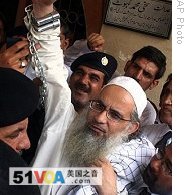Islamabad
15 April 2009
Pakistan's Supreme Court has granted bail to the hard-line cleric who led Islamabad's Red Mosque - a former hub for the country's militant groups. The military's deadly assault on gunmen barricaded inside Abdul Aziz's mosque in 2007 sparked a surge in militant attacks.
 |
| Maulana AbduL Aziz, the chief cleric of Islamabad's Red Mosque (2007 file photo) |
Cleric still faces charges
Lawyer Shaukat Siddiqui told reporters outside the court that his client still faces charges relating to the July 2007 standoff between armed religious students, militants and security forces in the heart of Islamabad.
He says today the justices observed there was no solid evidence that would prevent the cleric from being granted bail.
Siddiqui said he plans to submit a bail payment of about $2,500 to the country's anti-terrorism court, after which his client will be free while he awaits trial.
Who is Abdul Aziz?
Abdul Aziz was a top cleric at Lal Masjid, or the Red Mosque, in Islamabad - a hard-line Sunni mosque with a history of links to militant groups. In late 2006 and 2007, students at the male and female seminaries attached to the mosque participated in anti-government demonstrations and called for the imposition of Islamic law.
After a series of occasionally violent demonstrations and confrontations with authorities, hundreds of people barricaded themselves inside the mosque complex in July 2007.
Cleric Abdul Aziz was caught trying to escape while dressed in a burqa. Soon after, commandos stormed the mosque, killing more than 100 people. Critics say hundreds more people were killed by security forces.
Al-Qaida, Taliban vow retaliation
The assault provoked a wave of anti-government protests and vows from al Qaida and Taliban-linked militant groups to carry out suicide bombings in retaliation.
Since the Red Mosque siege, militant attacks have sharply increased. Military analysts and western officials have worried the attacks have badly shaken Pakistan's already weak central government.